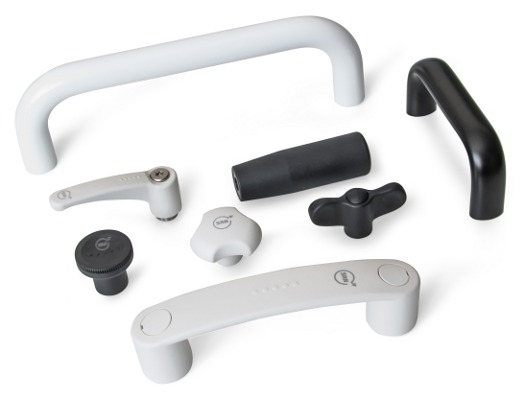 |
| April 06, 2021 | Volume 17 Issue 13 |
Designfax weekly eMagazine
Archives
Partners
Manufacturing Center
Product Spotlight
Modern Applications News
Metalworking Ideas For
Today's Job Shops
Tooling and Production
Strategies for large
metalworking plants
Antibacterial handles stop germs in their tracks
Contact infections with viruses, fungi, and bacteria were already a problem even before the pandemic, and now JW Winco is expanding its Sanline range of antibacterial products.
Bacteria with high resistance to common antibiotic therapies have been on the rise for years, especially in hospitals. These infections can become a serious problem even outside of healthcare facilities. Nursing homes, pharmacies, schools, and food production facilities as well as large-scale livestock operations are also locations at significant risk.

One part of the solution involves surfaces that people come into contact with -- in other words, handles, buttons, switches, plugs, tables, keyboards, and even touch screens. Bacteria, fungi, and viruses can collect in these locations, form a biofilm that facilitates growth, and eventually be transferred to the next user. Reliably interrupting this very simple transmission route is therefore a worthwhile objective. The fewer microorganisms present on such surfaces, the lower the infection risk.
Frequent cleaning and disinfection is one solution, but it is prone to errors and can exhibit problematic gaps. It is far more effective and reliable for the surfaces themselves to have an antimicrobial effect. Any microorganisms coming into contact with such surfaces are then automatically deactivated, and this prevents their transmission. Moreover, such effects can last a long time.
JW Winco began addressing this extremely relevant social problem years ago by adding antibacterial protection to a whole series of standard parts, grouped into the Sanline product family. The various handling elements -- buttons, hand levers, U-handles, and wing nuts -- make use of two different principles. In the case of plastics, special additives with silver ions are mixed in, while metal parts are given powder coatings based on zinc molybdate.
Both technologies destroy the cell walls of the microorganisms, causing them to die. For humans, contact with such activated surfaces poses no risk whatsoever. Zinc molybdate additives are of particular interest. With the help of moisture in the air, an acidic film with a pH of about 4.5 forms on the surfaces -- similar to the one on human skin. The acid protons penetrate the cell membrane of the bacteria, quickly destroying them.
Both principles remain effective for a long duration, even despite frequent cleanings. Note: The antibacterial properties are no replacement for cleaning or disinfection, but they serve as a long-lasting additional measure.
Sanline standard parts have been tested successfully according to ISO 22196:2011-08 "Plastics - Measurement of antibacterial activity on plastics and other non-porous surfaces." The active principle demonstrably reduces the growth of bacteria within 24 hours so that contaminated surfaces ultimately have less than 0.2% of the original number of microbes.
More information on Winco antibacterial parts can be found at www.jwwinco.com/en-us/antibacterial-parts-sanline.
Source: JW Winco
Published April 2021
Rate this article
View our terms of use and privacy policy
